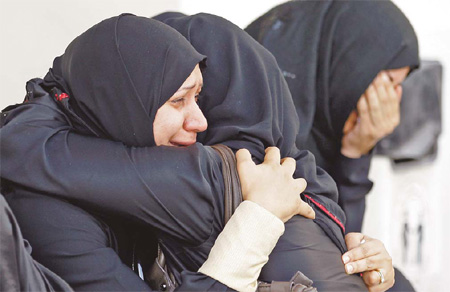Army deploys after Bahrain police raid
Troops took control of Manama on Thursday after riot police stormed an anti-government protest camp at dawn and fought demonstrators on the streets, killing four people in Bahrain's worst violence in decades.
 |
|
Women are overcome by emotion as they wait outside a hospital in Manama, Bahrain's capital, where victims of clashes between anti-government protesters and riot police were being treated on Thursday. [Hassan Ammar / China Daily via Agencies] |
Foreign Minister Sheikh Khaled bin Ahmed al-Khalifa said police action pulled Bahrain back from what he called the brink of a sectarian abyss. "So it was a very important step that had to happen. Police took every care possible."
Police cleared the capital's Pearl Square of mainly Shi'ite protesters demanding more say in the Sunni-ruled island kingdom.
"This is an atrocity," Abdul Jalil Khalil, a senior member of the main Shi'ite party Wefaq told Reuters. "Whoever took the decision to attack the protest was aiming to kill."
Health Minister Faisal bin Yaqoob al-Hamer said three people were killed and 231 hurt in the police operation and an opposition MP told Reuters later a fourth person had died of his wounds.
The crackdown by the Bahraini authorities appeared designed to snuff out the protests before they could gather momentum, unlike the sustained unrest that unseated Egypt's Hosni Mubarak.
Inspired by popular revolts in Tunisia and Egypt, the unrest in Bahrain, home to the U.S. Navy's Fifth Fleet, will alarm Saudi Arabia and the United States, which both see the island's al-Khalifa dynasty as a bulwark against Shi'ite Iran.
"I'm not saying that Bahrain is on the brink (but) should it become clear that the regime is in danger, the Saudis will step in," said Gala Riani, senior Middle East analyst at IHS Global Insight in London.
The Shi'ite bloc Wefaq, which holds 17 of parliament's 40 seats, planned to quit the assembly in protest. MP Ibrahim Mattar said his group and six others had demanded the government resign and make way for a new national unity cabinet.
Jane Kinninmont, an analyst at the Economist Intelligence Unit, said Wefaq was a cautious group trying to work within the system. "If they feel they can no longer do that then this is a sign of increasing polarization," she said.
"I assume there are divisions within the government ... (and that) the reformers are worried the crackdown has gone too far. Clearly these images of Bahrain are not going to be good for foreign investment," Kinninmont said.
The protesters want the Sunni ruling family to relinquish control over top government posts and address the grievances of Shi'ites over economic hardship, lack of political freedom and discrimination in jobs in public service and the military.
 0
0 







Go to Forum >>0 Comments